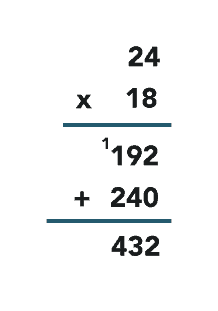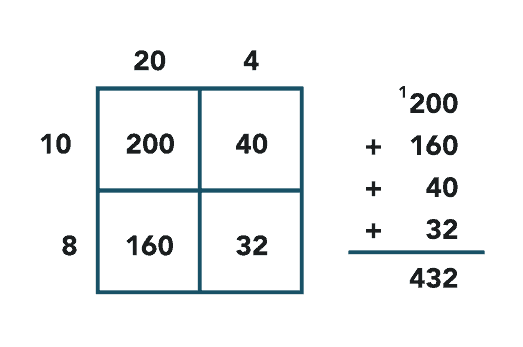Blog Post Heading
Blog Post Content
By Michelle Haver
Senior Editor, MindEdge Learning
What’s 24 x 18? If you’re like me, you’ll probably pull up a calculator to find the answer.
Let’s say you don’t have access to a calculator–how would you calculate 24 x 18 by hand?
Some of you may use the standard approach using stacked multiplication:

Elementary students today are initially taught a different method, called the box method:

The significant differences between the two methods highlight a problem many people face when they look at today’s math education: they just don’t teach math like they used to. But that’s not necessarily a bad thing. The standard algorithm relies on rote memorization of the process, while this “new” method connects the previously introduced concepts of multiplication and place value.
Fourth-grade students learn the box method under the Common Core State Standards for Mathematics, which were adopted by most states across the U.S. in 2010. Students learn to multiply numbers using the standard algorithm in fifth grade, but the box method provides a stepping stone to help students understand the multiplication process beyond rote memorization.
While some mathematical methods have changed over the last decade, the way many people feel about math has not. A helpful tool for children first learning a concept, such as the box method, may get lost in translation as pre-Common Core individuals try to navigate the “new” math. Pair this with the uneasiness that many adults feel about math in general, and you could be headed for a disaster.
Math Anxiety and Achievement
How did you feel when you read the beginning of this blog post? If your heart rate increased or you struggled to focus on the rest of the opening paragraph, you may have experienced symptoms of math anxiety.
The American Psychological Association defines math anxiety as “apprehensiveness and tension associated with the performance of arithmetic and other mathematical tasks.” Research suggests that about 17% of the population suffers from high levels of math anxiety, with possibly more experiencing lower levels of anxiety.
More than any other subject, mathematics inspires contradictory emotions among people. We understand that math is important, but many people consider themselves bad at it. These negative thoughts can affect everyone—even people who really like math. Several times during my pursuit of a master’s degree in mathematics, I questioned whether I was good enough to continue. Struggling and making mistakes are parts of the learning process, but you might be more likely to conclude that you’re bad at math if you struggle to solve a problem—when you simply need more practice.
People who experience math anxiety likely avoid the subject at all costs, but they run the risk of passing their math avoidance on to the next generation. Researchers have studied the relationship between parents’ math anxiety and their child’s math anxiety and performance. Much of the research suggests that children echo their parents’ feelings. A study reported in Sage Journals, Teacher Math Anxiety Relates to Adolescent Students’ Math Achievement, found that “higher teacher math anxiety is inversely related to how well students perform in their ninth-grade math course, even after adjusting for prior achievement and students’ own mindset.” They found that teachers with higher levels of math anxiety may use less process-oriented teaching strategies, affecting the students’ achievement and perceptions of their abilities. Even those with the best intentions may negatively affect a child’s math confidence and achievement.
Tips for Overcoming Math Anxiety
There’s no question that math and numbers are everywhere in our world. However, a study on adult numeracy by the National Center for Education Statistics shows that about one-third of adults in the United States do not have sufficient skills to perform calculations, estimate values, or interpret statistical tables in English. You may not need to perform calculations like 24 x 18 very often, but you likely use mathematical principles in everyday tasks, such as cooking dinner, managing a budget, or deciding what time you absolutely need to get out of bed to get to work on time. Developing greater confidence in your math skills may make these daily calculations easier.
The following strategies may help you feel more confident in your mathematical abilities:
- Understand your feelings about math: The first step in overcoming math anxiety is to acknowledge it. Take a moment to assess how you feel about math and why you feel that way.
- Edit your self-talk: It’s okay to struggle with a math problem, but avoid immediately telling yourself that you’re just bad at math. Try saying, “I don’t know the answer right now, but I can keep trying.”
- Seek help if you need it: If you don’t know the answer, find a solution elsewhere. You can call on a colleague, family member, or the internet to help.
- Practice, but make it fun: Add games like Ooodle to your daily routine to refresh your math skills.
- Embrace a growth mindset: You will likely make mistakes along the way, but a growth mindset reflects the belief that you can develop your abilities through practice.
To take a look at the topics covered in MindEdge’s College Math course, click here.
Copyright © 2023 MindEdge, Inc.
